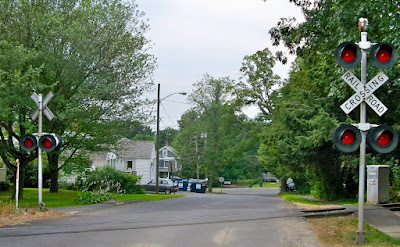Amherst Select Board Chair Stephanie O'Keeffe was hardly soothed by the Town Manager's Report--or I should say update--concerning the twin train derailments and the resulting measures taken by
New
England
Central
Railroad to address them.
If the cause of both potentially devastating mishaps was a "high water table" (and that area is indeed a swamp) then simply replacing old rotted ties and fasteners does not address the underlying
problem, although it certainly helps.
But if that was pretty much
NECRs response--surface hardware replacement-- then if they had refurbished those long neglected rails a few months earlier, would it not have prevented both accidents?
A
recent study by UMass Hydrogeologist David Boutt published in the journal Geophysical Research Letters demonstrates that as a result of rising temperatures and climate change, average precipitation in the Northeast has
increase by 30% since 1900, and water tables have indeed become consistently higher over the past ten years.
Since this a long-term phenomena, chances are it's
not going to reverse itself in the short-term future. Combine this soggy weather trend with the activity of beavers in that low lying area and you have a recipe for returning to the prehistoric days of Lake Hitchcock.
Perhaps when the tracks near Station Road are submerged,
NECR or the
Federal
Railroad
Administration will address the
real problem.
Let's hope they do so
before another accident occurs.
 Trains, bike paths, beavers and global warming make for a bad mix
Trains, bike paths, beavers and global warming make for a bad mix



























































